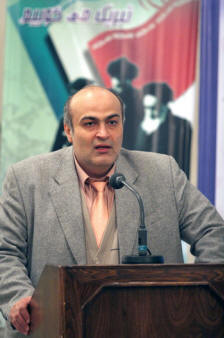Jewish Representatives to the Parliament
Dr. Siamak Moreh-Sedegh (Moreh-Sedgh)

Dr. Siamak Moreh-Sedegh, sometimes transcribed as “Moreh-Sedgh”, was born in 1965 C.E., 1344 of the Persian calendar, to a religious Jewish family of Shiraz, Iran. His paternal ancestor, Agha Baba and his son Mullah Yousef Moreh-Sedegh, were two conservative Jewish clerics, who had led the Jewish community of Shiraz for decades since about 350 years ago.
Siamak Moreh-Sedegh studied at the Kousar Elementary and the Gifted Students High School of Shiraz. In 1983 C.E., he enrolled in Shiraz School of Medicine. In 1990, having earned his degree in general medicine, summa cum laude, he went straight into the general surgical internship program at the Namazi Hospital, and thus he began to practice medicine as a general surgical assistant. In 1995, he passed the board exam, specializing in general surgery, and he was at once employed as an Assistant Professor at the University of Medical Sciences, the Province of Kurdistan, Iran. In 1998, he was entrusted with the Center for the Research and Development of the Education of Medical Sciences, the Province of Kurdistan, a subsidiary of the Kurdistan University, Iran. Two years later, in 2000, he was put in charge of the emergency center of the Kurdistan Province, with focus on the planning and designing of the surgeries. Besides, beginning in 1995, he served for years as a cantor at a synagogue in the city of Sanandaj, in the western Iran.
Siamak Moreh-Sedegh began his social activities in 1981 C.E., when he joined the students subdivision of the Sazeman-e Daneshjooyan, i.e. the Iranian Jewish Academic Students Organization of Shiraz.
In 2002 C.E., by the invitation of the Board of Directors of the Kanoon-e Kheyr-Khah or “The Jewish Philanthropy Center”, he moved to Tehran to serve as the Chair of the famed Dr. Rouhollah Sapir Hospital.
That same year, in 2002 C.E., Dr. Moreh-Sedegh married his future wife, Tina Rabie-Zadeh.
In 2006 C.E., given his demonstrated merits and capabilities, Dr. Siamak Moreh-Sedegh was selected as the Chair of the Tehran Jewish Association. In 2008, however, before the end of his term, he resigned that post in order to run for the Jewish seat in the Parliament. He won the seat and began his services as the Representative of the Jewish community in the Eighth Islamic Parliament. As he took his seat, he was selected to the Health Commission of the Parliament, to the Parliamentary Relations With the European Union Group, and as its Parliamentary member, to the National High Council of Insurance. Concurrently, he continued to serve as the Chair of Dr. Sapir Hospital.
With his relentless efforts, Dr. Siamak Moreh-Sedegh did much to resolve the legal issues that the Jewish community of Iran was faced with. In particular, he was in contact with the recruitment authorities of the system in regards to the persisting problems that hindered the employment of the minorities. He complained to and negotiated with those in charge of the Iranian TV and Radio regarding the broadcast of certain TV series which went against the Jewish religious values. He also protested in writing against the display of caricatures about the Holocaust.
Dr. Moreh-Sedegh’s earlier achievements also include:
*) Obtaining financial support for the deprived members of the society and for women’s athletic activities;
*) Obtaining 40 million toomans in 2009 C.E. from the Executive Vice Chair of the President to buy the needed units of ambulance for the Beheshtieh “Eden” Jewish Cemetery of Tehran;
*) Obtaining 300,000 dollars from the Ministry of Health and Medical Education in aids for Kanoon-e Kheyr-Khah or “The Jewish Philanthropy Center”, the parent organization of Dr. Sapir Hospital.
*) Obtaining a 50% increase in the budget approved by the Ministry of State for the annual activities of the religious minorities.
Since 1990 C.E., Dr. Siamak Moreh-Sedegh has also carried out scientific and medical research, as his sideline field, on Prophylactic Antibiotics in Clean Surgical Wounds.
Also, since 2009 C.E., he has served as the Managing Editor of Ofogh-e Binah, “The Horizon of Wisdom”, the monthly magazine published by the Tehran Jewish Association.
He’s also been accepted to the Board of Directors of the Research Studies Center of the Iranian Jews.
In 2011 C.E., the month of Khordad, 1391 of the Persian calendar, Dr. Siamak Moreh-Sedegh was re-elected by the majority vote of his constituency for a second term to serve as the Representative of the Jewish community in the Ninth Islamic Parliament.
At this point, even as he maintained his earlier posts, he broadened the scope of his activities. On September the 23rd, 2013 C.E., Dr. Siamak Moreh-Sedegh accompanied the seventh Iranian President, Dr. Hassan Rouhani, as a member of the presidential team, for a five-day trip to New York to attend the 68th General Assembly of the United Nations.
In 2016, by the advice and support of the Jewish community, Dr. Siamak Moreh-Sedegh ran for the Tenth Islamic Parliament. And once more, by the majority vote of his constituency, he defeated his opponent to serve for a third term in the Parliament, keeping his previous posts, and carrying on with his many crucial responsibilities.
During his years in the Parliament, Dr. Siamak Moreh-Sedegh has complained on many occasions against the biased position of the Iranian TV and Radio, and some of the other national media outlets, which had broadcast some negative propaganda and insulting programs that went against the Jewish religious values. He has further complained that the holidays and other cultural and social events particular to the religious minorities have been largely absent in the national media — a matter of concern treated with apparent indifference by some of those in charge, and which has somewhat disappointed and worried the Jewish community over the past many years.
Thus, as the Representative of the Jewish community in the Parliament, Dr. Moreh-Sedegh has asked for an end to such provocative acts, which could lead to certain insecurities within the society, and especially to certain misunderstandings against the Jewish people. To that end, and on many occasions, he has contacted the corresponding authorities to communicate such concerns and to submit his grievances.
Moreover, in the interviews conducted by the national media, Dr. Siamak Moreh-Sedegh has consistently insisted on making the distinction between Judaism and the Political Zionism, so far as they should be treated as two separate subjects.
Dr. Siamak Moreh-Sedegh has so far recorded numerous significant and meritorious services to his résumé of social and cultural activities, both at home and abroad. They in part include:
*) He participated in the 23rd United Nations Human Rights Council Assembly in Geneva, where he described the situation of the religious minorities in Iran.
*) He has offered many interviews in either Persian or English, through which he has announced unequivocally the positions assumed by the Iranian Jewish community in respect to defending their national interests and their rights as citizens of the country of Iran.
*) In particular, he has offered interviews to the English language channels of CNN and BBC, the Italian newspaper Corriere Della Sera, and the American publications, Newsweek and Time, as well as several of the other world news outlets.
Moreover, Dr. Siamak Moreh-Sedegh has participated in the annual summits of the interfaith dialogue held in Iran, the United States of America, and elsewhere. On his trips to Italy and the Vatican, he met with several Catholic Cardinals to discuss the matter of interfaith conversation. In Germany, he has attended many annual events as a member of the Friday Morning Parliamentary Prayers. He has been to New York, alongside the Iranian President Dr. Hassan Rouhani, to attend the annual Assemblies of the United Nations. At home, together with the other religious minority MPs, he met with His Honor the Leadership of Iran. He has communicated the wishes, concerns and grievances of the Jewish community, in writing and in person, to Dr. Hassan Rouhani, the President of the Islamic Republic of Iran. He has also met repeatedly with many of the other high-ranking figures of the state, including those in charge of the peace forces, to appreciate their particularly caring attention to protecting the Jewish holy sites located across Iran.
Dr. Siamak Moreh-Sedegh believes that as citizens of the country, the Jews of Iran have always fulfilled their obligations toward their homeland. And he points out that particularly after the establishment of the Islamic Republic of Iran, the Iranian Jewish martyrs have stood as a most solid testament to that truth. Besides, he continues to emphasize that as one of their most basic and primary rights as citizens of Iran, the Jewish community is entitled to be treated as equal, on par with those of the other sectors of the Iranian society. He also believes that all of the existing problems facing the religious minorities could be resolved within the framework of the Constitution of the Islamic Republic of Iran.
Related Links:


 فارسی
فارسی